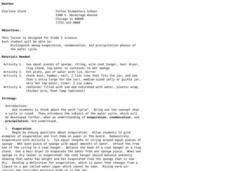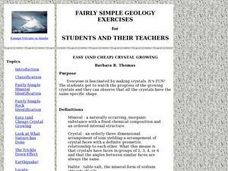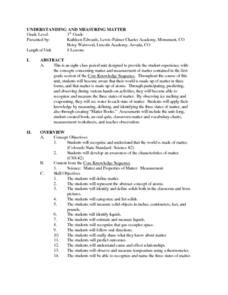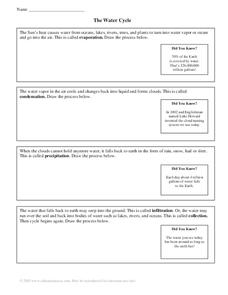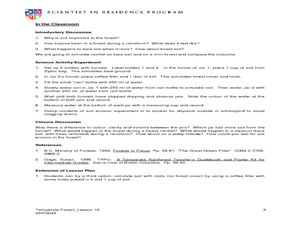Scholastic
Study Jams! Solids, Liquids, Gases
Your physical science class learns that there are three states of matter, and that adding or removing heat can cause it to change from one state to another. By the animations, printed information, and discussion between RJ and Zoe, they...
American Chemical Society
Energy Foundations
Only 10 percent of an incandescent bulb's energy is used to create light; the remaining 90 percent is heat. In the unit of activities, young chemists examine energy through hands-on activities, videos, discussions, and readings. Scholars...
Science 4 Inquiry
States and Phases of Matter
Plasma is the most common phase of matter in our universe. Scholars explore the change of energy as molecules change phases of matter. They rotate through stations, graphing the changes in energy level.
Rice University
College Physics for AP® Courses
Take a look at an organized physics course. The 34-section electronic textbook covers material in AP® Physics 1 and 2. Teachers use the text to supplement lectures and have the class work through the labs. Each section contains multiple...
Curated OER
Weather
Fifth graders study the water cycle. In this science lesson plan, 5th graders distinguish among evaporation, condensation, and precipitation phases of the water cycle.
Curated OER
How Much Salt is in the Gsl Water?
Fourth graders study the water cycle and the different processes that are involved, like precipitation, evaporation, etc. They conduct an experiment observing the water cycle in action and write a hypothesis, observations and...
Curated OER
Cloze Activity: The Water Cycle
In this recognizing the water cycle cloze activity learning exercise, students use the words in the word box to fill in the blanks about evaporation, condensation, precipitation, and runoff. Students write 23 answers.
Curated OER
EASY (AND CHEAP) CRYSTAL GROWING
Students grow salt crystals by making a saturated solution of table salt and let the solution sit around and evaporate.
Curated OER
Rock Candy
Fourth graders observe and demonstrate the physical change of dissolving sugar in water and evaporating the water to examine the physical change that has occurred. They discuss physical changes and solutions, and make rock candy,...
Curated OER
Rock Candy Crystals
Learners discover how rocks are created. In this rock formation lesson, students investigate saturation, evaporation, and phase changes in geology. Learners create rock candy from skewers, string, boiling water and sugar.
Curated OER
Air and Water in the Environment
Students explore the traits of water condensation and evaporation. In this water cycle lesson, students develop an awareness of the importance of water for sustaining life. Students participate in a hands-on activity in which water is...
Curated OER
Lakes and Ponds
Students describe and recognize the difference between a lake and a pond. They name six ways in which a lake or pond can be formed. They describe the importance and act of evaporation on a waterway.
Curated OER
Understanding And Measuring Matter
First graders observe ice melting and water evaporating. They experiment with sugar and water and read the poem "Matter Really Matters." They define vocabulary words and sing a matter song.
Curated OER
Refrigeration Part 2 - How they work
Fourth graders investigate insulators and how refrigerators actually work to keep things cold through evaporation and pressure changes in the coolant. They create a box to keep an ice cube from melting, and observe a variety of...
Curated OER
The Water Cycle
In this science worksheet, learners learn about the water cycle by reading 4 information paragraphs about evaporation, condensation, precipitation and infiltration/ collection. After each paragraph, students draw a picture of that process.
Curated OER
Forest as a Filter
Students experiment using soil and water. In this forest as a filter lesson, students identify the role of forest cover, vegetation, and foliage impacts erosion and evaporation. Students conduct a simple experiment, form a hypothesis,...
San Francisco Public Utilities Commission
What is Drought? No Rain, No Water
How can climate change affect our water supply? Have kids read a passage about the water cycle and water conservation, which includes six questions that challenge them to use context clues.
Illinois Department of Natural Resources
Section Two: Why is Biodiversity Important?
Explore soil, genetic traits, natural resources, and pollution in a series of lessons that focus on biodiversity. Kids complete experiments to learn more about the importance of varied genes and organisms in an ecosystem.
Discover Earth
Weather Stations
Transform your classroom into a fully functioning weather station with this series of hands-on investigations. Covering the topics of temperature, precipitation, wind patterns, and cloud formation, these activities engage young...
It's About Time
The Water Cycle
Explore the water cycle with a hands-on earth science activity that prompts pupils to measure the amount of water normally transpired by plants. After they describe the flow of the water cycle and provide examples of how human activities...
Center for Learning in Action
Water—Changing States (Part 1)
Here is part one of a two-part lesson in which scholars investigate the changing states of water—liquid, solid, and gas. With grand conversation and up to three demonstrations, learners make predictions about what they think will happen...
Center for Learning in Action
Water – Changing States (Part 2)
Here is part two of a two-part lesson in which scholars investigate the changing states of water—liquid, solid, and gas—and how energy from heat changes its molecules. With grand conversation, two demonstrations, and one hands-on...
Virginia Department of Education
The Cycles of Nature
Encourage peer collaboration and assist with the creation of visual aids to identify carbon, water, and nitrogen cycles as your class learns more about nature. They discuss relative information, create a visual aid depicting the chosen...
US Geological Survey
The Water Cycle — A Placemat for Kids
What better time to reinforce a concept than when you're eating? Boost scholars' knowledge of the water cycle with an eye-catching placemat featuring playful raindrops and bright colors.
Other popular searches
- Water Cycle and Evaporation
- Evaporation Experiment
- Evaporation and Condensation
- Condensation Evaporation
- Evaporation Kindergarten
- Heat and Evaporation
- Water Evaporation
- Melting and Evaporation
- Science Evaporation
- Filtration and Evaporation
- Condensation Evaporation Dew
- Evaporation and Temperature






